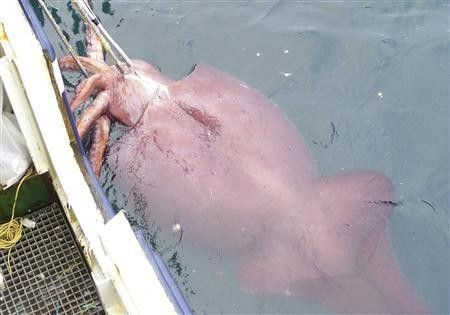New Zealand Scientists Dissect Well-Preserved Female Colossal Squid [VIDEO]

New Zealand scientists Kat Bolstad from Auckland University of Technology led the dissection of a colossal squid. She described the animal as having a big and delicate eye. She said it was rare to see an eye specimen in good condition.
Scientists measured the squid's eye and found it was about 35 centimetres in diametre. Bolstad said she and her colleagues were excited to find eggs inside the squid. She quoted by the Sydney Morning Herald as declaring it was "the most perfect colossal squid that I have seen."
In 2008, scientists examined the first intact specimen of a colossal squid which was also brought to Te Papa. Bolstad was in awe to see the latest specimen well-preserved. Scientists were able to study the squid in greater detail including the lens in the squid's eyes.
A fishing vessel in Antarctica found the colossal squid in the water. The captain of the boat recognised the animal, carefully cast a net and then brought it aboard. Captain John Bennett and his crew saw the colossal squid still alive as it was hanging onto a fish. He and his men aboard the vessel were amazed to have seen such a big squid.
Te Papa museum senior curator Susan Waugh said scientists want to find out more about the animal and its role in the food chain. They are also interested in finding the genetic differences between several squid types.
Reports said the exact number of colossal squid in the ocean remains unknown. But Bolstad believes sperm whales in the Antarctic sea eat the massive squids.
New Zealand scientists have made the dissection available to the public via live streaming. Scientists said it was a great opportunity for them to examine such a well-preserved specimen.
Bolstad said ancient sightings of the colossal squid gave rist to tales of the "kraken," a monstrous squid and other giant creatures under the sea. Sailors may have mistaken the sight of sperm whales eating the squid as an "epic battle." Scientists said sperm whales often play with their food before they eat.
The streaming footage of the examination has attracted over 140,000 viewers from 180 countries. After samples were taken from the squid, scientists plan to preserve it for further study.
(Source: YouTube/Museum of New Zealand Te Papa)




















